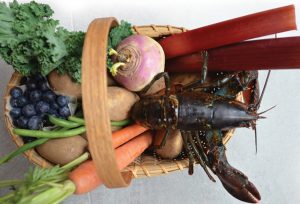This talk is available via Zoom. Registration is required due to security concerns. Please complete the registration form to receive the Zoom connection information.
 Speakers:
Speakers:
Rachel Schattman, Assistant Professor, School of Food and Agriculture, UMaine
Kate Yerxa, Extension Professor, Cooperative Extension and School of Food and Agriculture, UMaine
Food insecurity, or the “lack of consistent access to enough food for an active, healthy life”, is an economic and social justice problem worldwide, including in Maine. This issue is the focus of many programs and initiatives at the federal, state, and local level. Despite long-standing efforts to alleviate the problem, food insecurity persists. Additionally, according to the United Nations, the impact of COVID-19 is likely to have global implications for food insecurity. This presentation will cover the fundamental tenets of food insecurity, and will summarize a recent survey of how Mainers’ food security has been affected by COVID-19 and what they are doing to cope. The interactive session will have a solutions-focus; we hope you will join us and bring your ideas about how to address these issues as a State.
Funding for this research was provided by the University of Maine School of Food and Agriculture and the Mitchell Center for Sustainability Solutions.
Dr. Rachel Schattman is an Assistant Professor in the School of Food and Agriculture. The overarching goal of her work is to engage in research that leads to sustainable agricultural and food systems. In pursuit of this goal, she works with specialty crop producers and agricultural advisors to identify and address production challenges, specifically through the lens of climate change adaptation. Her approach is grounded in complimentary traditions of agroecology and participatory action research (PAR).
Kate Yerxa, MS, RD is an Extension Professor who holds a joint appointment with Cooperative Extension and the School of Food and Agriculture, and is the state coordinator for the Expanded Food Nutrition Education Program (EFNEP) through UMaine Extension. Kate has experience designing and evaluating nutrition education interventions for food insecure populations in Maine and throughout the nation.

